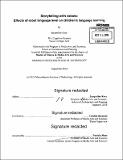Storytelling with robots : effects of robot language level on children's language learning
Author(s)
Kory, Jacqueline (Jacqueline Marie)
DownloadFull printable version (11.19Mb)
Alternative title
Effects of robot language level on children's language learning
Other Contributors
Massachusetts Institute of Technology. Department of Architecture. Program in Media Arts and Sciences.
Advisor
Cynthia Breazeal.
Terms of use
Metadata
Show full item recordAbstract
Children's oral language skills in preschool can predict their academic success later in life. Increasing children's skills early on could improve their success in middle and high school. To this end, I examined the potential of a sociable robotic learning/teaching companion in supplementing children's early language education. The robot was designed as a social character, engaging children as a peer, not as a teacher, within a relational, dialogic context. The robot targeted the social, interactive nature of language learning through a storytelling game, mediated by a tablet, that the robot and child played together. During the game, the robot introduced new vocabulary words and modeled good story narration skills. In a microgenetic study, 17 children played the storytelling game with the robot eight times each over a two month period. With half the children, the robot adapted its level of language to the child's level - so that, as children improved their storytelling skills, so did the robot. The other half played with a robot that did not adapt. I evaluated whether this adaptation influenced (i) whether children learned new words from the robot, (ii) the complexity and style of stories children told, and (iii) the similarity of children's stories to the robot's stories. I expected that children would learn more from a robot that adapted, and that they would copy its stories and narration style more than they would with a robot that did not adapt. Children's language use was tracked across sessions. I found that children in the adaptive condition maintained or increased the amount and diversity of the language they used during interactions with the robot. While children in all conditions learned new vocabulary words, created new stories during the game, and enjoyed playing with the robot, children who played with the adaptive robot improved more than children who played with the non-adaptive robot. Understanding how the robot influences children's language, and how a robot could support language development will inform the design of future learning/teaching companions that engage children as peers in educational play.
Description
Thesis: S.M., Massachusetts Institute of Technology, School of Architecture and Planning, Program in Media Arts and Sciences, 2014. Cataloged from PDF version of thesis. Includes bibliographical references (pages 62-66).
Date issued
2014Department
Program in Media Arts and Sciences (Massachusetts Institute of Technology)Publisher
Massachusetts Institute of Technology
Keywords
Architecture. Program in Media Arts and Sciences.